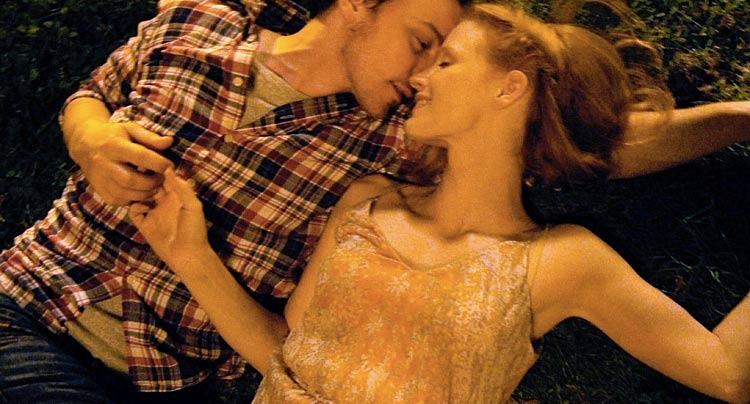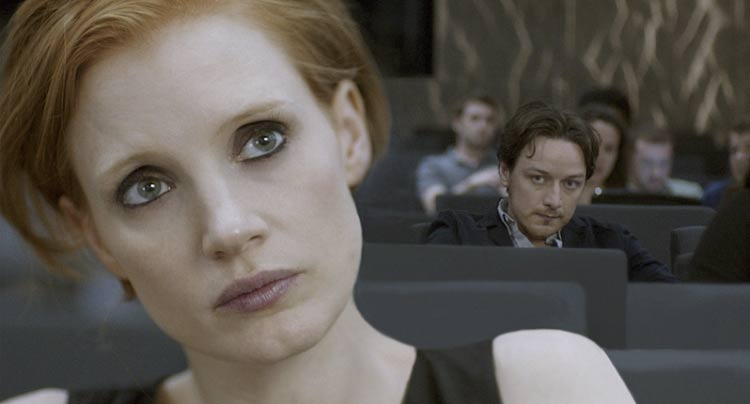
An anti-romance drama dripping in realism makes for a somewhat frustrating, albeit well performed film.

An anti-romance drama dripping in realism makes for a somewhat frustrating, albeit well performed film.
Viewing an on-screen relationship from somewhere in the middle can be a difficult place to be in as a film viewer. Finding two characters in a juncture in their story when one’s had no time to form any sort of attachment yet, makes for the sort of film viewing that practically demands distance. The Disappearance of Eleanor Rigby most certainly asks that of its viewers. Asking for patience in abundance as it fills us in on the current, past, and potential future of a young New York couple. And to make sure the severity of their rift is felt, the film opens with a suicide attempt.
Eleanor Rigby (Jessica Chastain) has a name inspired less by the Beatles and more by missed opportunity and a sense of fate. After a brief scene of young love between her and boyfriend Conor (James McAvoy), she’s seen biking down the Brooklyn bridge. With a sense of calculation, she leaves her bike and heads for the fence.
In the hospital, Conor, her now husband, flies to her side, panicked. But when she’s healed and it’s time to leave, it’s her sister Kate (Jess Weixler) who takes her back to their childhood home to stay with their parents. Her French musician mother Mary (Isabelle Huppert) awaits her on the front steps, glass of wine in hand. Her father Julian (William Hurt), the academic and therapist, is especially concerned and encourages Eleanor to take some classes while she figures out her life.
Eleanor enrolls and when her father encourages her to crash Professor Friedman’s (Viola Davis) class, she does so with hardly any real argument why Professor Friedman should allow her to join the class, but an unlikely friendship is sparked between the two and Eleanor finds her to be an encouraging outsider. A safe friend unaware of Eleanor’s tragic recent past.

Meanwhile Conor does his best to find out how Eleanor is, since she’s thrown away her phone, resorting eventually to stalking her at the school. He passes her a note in her class one day and upsets her enough that she leaves class. Despite what little we know of their former selves before this juncture in their relationship, it’s clear Eleanor has changed greatly and it’s equally true Conor wants to return to what they once had. One of them stuck in the ambiguity of who they are, and who they are as part of a couple after a major life change, and the other stuck in the remembrance of how good things once were.
It’s easier to understand The Disappearance of Eleanor Rigby when one takes into account that it was originally two films. Him and Her. One focused on their relationship from Conor’s perspective, the other from Eleanor’s. At times throughout the film there seems to be much left unsaid, much that was most likely covered in the individual films that was cut to make Them work without being overwhelming.
But it’s exactly that hesitation that keeps The Disappearance of Eleanor Rigby from true greatness. In his feature directorial début (or should we call it third film?), Ned Benson has crafted a tale of two people completely unable to communicate. And though the inability to communicate with someone at a juncture where grief makes it entirely hard to relate is realistic, as an editing and filmmaking tool it makes for somewhat frustrating viewing.
The emergence of the so-called “anti-romance” is a sign of the times, of the burgeoning destruction of the Hollywood ending in favor of realism and relatable romantic scenarios. And while I appreciate this perspective and the way it resonates in our modern world, I can’t help but always wonder where the realistic side character is, the one yelling at the main characters to grow up and just have a normal conversation. Bill Hader‘s Stuart, Conor’s best friend and chef at his restaurant, comes close. Doing his best to explain to Conor the egg shells he has to walk on around his friend when it comes to his marriage. And Viola Davis is truly fantastic as Professor Friedman, but her wisdom and usefulness to Eleanor seems to stem entirely on her not actually knowing anything about Eleanor and her immediate life. She just seems to accidentally give Eleanor the friendship she needs at a time when she accidentally needs it.
Plenty of conversations with their family members would seem to be the ideal pathway to character growth, but strangely it’s these scenes that drag the most. Much of the time spent skirting around the obvious topics needing real study.

The audience is only clued in to Eleanor and Conor’s central concern rather late in the film, though it’s not hard to figure out they don’t suffer from simple relationship troubles. Strangely Benson chooses to show flashbacks from the couple’s early days, before they were married and in the blissful throes of young love, rather than scenes from their marriage. In a sense it brilliantly shows the same blind spot the main characters seems to possess, an idea of when things were new and good, juxtaposed with the present when they seem so bad, while showing an unawareness of when they were just in the middle, living out their love on a day by day basis.
With all that anti-romance, anti-Hollywood ending, the characters fall into an age-old trap, resorting to reinventing themselves, albeit by returning to former passions and plans they once had before their marriage and troubles. So although the film won’t allow us to call its ending “sad” per se, it certainly doesn’t warrant the descriptor of “realistic”. Though I’ll give kudos to Son Lux for the musical placement, toying quite effectively with our hearts in a few key areas with some well-placed songs in a way that gives the implication of romance without actually showing it.
Chastain and McAvoy give phenomenal performances, every other scene playing out like the clip played by the Academy before they announce who gets the Oscar. But without the structure the story needs, their performances simply hit the screen as heavy and ineffective, the lack of insight into their psyches making for a detached relationship with viewers.
The Disappearance of Eleanor Rigby has all the realism of watching a pair of friends go through a rough spot in their relationship, without any of the catharsis of being able to advise and yell at them as perhaps a good friend ought to.